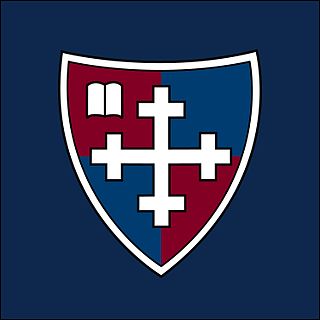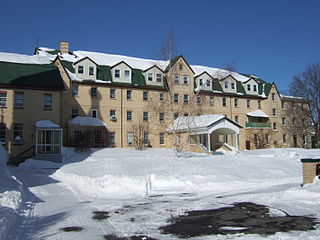
Gordon–Conwell Theological Seminary (GCTS) is an evangelical seminary with its main campus in Hamilton, Massachusetts and three other campuses in Boston, Massachusetts; Charlotte, North Carolina; and Jacksonville, Florida. According to the Association of Theological Schools, Gordon-Conwell ranks as one of the largest evangelical seminaries in North America in terms of total number of full-time students enrolled.

The Continuing Anglican movement, also known as the Anglican Continuum, encompasses a number of Christian churches, principally based in North America, with an Anglican identity and tradition but are not part of the Anglican Communion. These churches generally believe that traditional forms of Anglican faith and worship have been unacceptably revised or abandoned within some churches of the Anglican Communion but that they, the Continuing Anglicans, are preserving or "continuing" both Anglican lines of apostolic succession and historic Anglican belief and practice.

Union Presbyterian Seminary is a Presbyterian seminary in Richmond, Virginia. It also has a non-residential campus in Charlotte, North Carolina and an online blended learning program.
The Episcopal Divinity School (EDS) is a theological school in New York City that trains students for service with the Episcopal Church. It is affiliated with the Union Theological Seminary. Students who enroll in the EDS at Union Anglican studies program earn a Master of Divinity degree from Union and also fulfill requirements for ordination in the Episcopal Church. It is led by Dean Kelly Brown Douglas. Known throughout the Anglican Communion for progressive teaching and action on issues of civil rights and social justice, its faculty and students were directly involved in many of the social controversies surrounding the Episcopal Church in the latter half of the 20th century and at the start of the 21st.
Reformed Theological Seminary (RTS) is a theological seminary in the Reformed theological tradition with campuses in multiple locations in the United States. Founded by conservatives in the Southern Presbyterian Church, the Presbyterian Church in the United States, in 1966, it serves primarily students from more conservative branches of the Presbyterian and Reformed traditions.

Nashotah House is an American theological seminary in Nashotah, Wisconsin, in the Anglo-Catholic tradition of Anglicanism. The seminary opened in 1842 and received its official charter in 1847. The institution is independent and generally regarded as one of the more theologically conservative seminaries in the Episcopal Church. It is also officially recognized by the Anglican Church in North America. Its campus was listed on the National Register of Historic Places in 2017.

Atlantic School of Theology (AST) is a Canadian public ecumenical university that provides graduate level theological education and undertakes research to assist students to prepare for Christian ministries and other forms of public leadership. It is located in Halifax, Nova Scotia, Canada, and its enrolment is approximately 160 degree and non-degree students. Persons of all religious traditions, or none, are welcome to study at AST.

Church Divinity School of the Pacific (CDSP) is one of the nine seminaries of the Episcopal Church in the United States of America. It is located in Berkeley, California, and is a member of the Graduate Theological Union. The only Episcopal seminary located in the Far West, CDSP has, since 1911, been designated the official seminary of the Episcopal Church's Eighth Province, the Province west of the Rocky Mountains.
Saint Herman’s Orthodox Theological Seminary is an Orthodox Christian seminary located in Kodiak, Alaska, with a campus in Anchorage. Established as a pastoral school in 1972, the seminary now provides a number of educational programs to prepare students for work in the Orthodox Church, as readers, choir directors, church school teachers, and clergy.

The Interdenominational Theological Center (ITC) is a consortium of five predominantly African-American denominational Christian seminaries in Atlanta, Georgia. ITC is operating together as a professional graduate school of theology. It is the largest free-standing African American theological school in the United States.

Holy Trinity Orthodox Seminary is an institution of higher learning under the jurisdiction of the Russian Orthodox Church Outside Russia (ROCOR) and located near Jordanville, New York. Associated with Holy Trinity Monastery, the Seminary offers a four-year program of study leading to the degree of Bachelor of Theology (B.Th.). It is accredited by the Commissioner for Education and the Board of Regents at the University of the State of New York. The Master of Divinity (M.Div.) degree program began in Fall 2018.
Hellenic College Holy Cross Greek Orthodox School of Theology (HCHC) is an Orthodox Christian liberal arts college and seminary in Brookline, Massachusetts. Its mission is to educate individuals for life and service in the Orthodox Christian community; this includes men preparing for the priesthood of the Greek Orthodox Archdiocese and other Orthodox Christian entities, as well as men and women for leadership roles in the church or within secular society. HCHC includes a graduate school of theology, seminary for clerical training and education, and several undergraduate and certificate programs in business, education, literature, and other secular professions.
Vancouver School of Theology is a multi-denominational divinity school located on the campus of and formally affiliated with the University of British Columbia.
The Anglican Orthodox Church (AOC) claims to be the second oldest conservative Anglican denomination and the oldest to be formed in the United States in the 20th century. The AOC is not part of the Anglican Communion and does not have a formal relationship with the See of Canterbury.
James Parker Dees was the founder and first bishop of the Orthodox Anglican Church and the Orthodox Anglican Communion. Dees was born in Greenville, North Carolina on December 30, 1915, the son of James Earle Dees and Margaret Burgwin (Parker) Dees. He graduated in 1938 from the University of North Carolina at Chapel Hill with a Bachelor of Arts (BA) degree in political science and economics, then took a year of graduate study in international relations. From 1939 until 1942, he worked for the Atlantic Coast Line Railroad in Greenville, North Carolina. For two years after the Second World War, he was a baritone soloist with the New York Opera Company. He then studied at the Protestant Episcopal Church’s Virginia Theological Seminary for his Bachelor of Divinity degree, graduating in 1949. He was ordained as a deacon in the Episcopal Church on June 29, 1949; and as a priest by Thomas Henry Wright, Bishop of East Carolina, at the Church of the Holy Cross, in Aurora, North Carolina, on January 19, 1950. As a member of the Diocese of North Carolina, he served in charges in Aurora, Beaufort, and Statesville. His concerns about advancing liberalism caused him to withdraw from the denomination in 1963. Dees was discouraged from joining the Reformed Episcopal Church by Carl McIntire because of their association with groups perceived as being neo-evangelical. The decision to form a new jurisdiction was made. Dees founded the Anglican Orthodox Church on November 17, 1963 - the first religious body to withdraw from the PECUSA in the modern era. On Passion Sunday, March 15, 1964 Dees was consecrated a bishop by Wasyl Sawyna of the Holy Ukrainian Autocephalic Orthodox Church of North and South America, assisted by Orlando Jacques Woodward, a bishop of Old Catholic succession.

The Orthodox Anglican Church (OAC) is the American branch of the Orthodox Anglican Communion. Because of similarities in churchmanship and doctrine, it is usually considered to be part of the Continuing Anglican movement, although the church's origins predate the start of that movement and it was publicly critical of the Continuing Anglican churches when they were founded during the late 1970s.
The Orthodox Anglican Communion was established in 1964, as a self-governing worldwide fellowship of national churches in the Anglican tradition. The Orthodox Anglican Communion was one of the first such communions to be formed outside of the See of Canterbury and therefore is not part of the Anglican Communion. The Orthodox Anglican Communion adheres to the doctrine, discipline and worship contained in the classic Anglican formularies, especially in the 1662 English, 1928 American, 1929 Scottish and 1962 Canadian Books of Common Prayer.

Robert Joseph Godfrey was the third Presiding Bishop of the Anglican Orthodox Church, Metropolitan Archbishop of the Orthodox Anglican Communion and the President of Cranmer Seminary. In 1960 Godfrey completed his undergraduate work in South Carolina at The Citadel. He also completed a Msster of Education degree from Western Maryland College, and a Ph.D. from Wayne State University. He continued his education with post-doctoral studies at the University of Southern California, Boston University, Temple University, University of Edinburgh (Scotland), University of Manchester (England), University of Michigan, University of Central Florida, University of South Carolina, Loyola University. He also completed a Master of Divinity and Doctor of Ministry degrees at Trinity Theological Seminary, graduating summa cum laude in both degree programs. Significantly, during his tenure as bishop, Godfrey changed the legal name of the jurisdiction to the "Episcopal Orthodox Christian Archdiocese of America," while retaining the original incorporation. The church is now known as the Orthodox Anglican Church, matching the name of the international communion to which it belongs.
Charlotte Christian College and Theological Seminary is an evangelical Christian college and seminary in Charlotte, North Carolina, United States. The institution was established in 1996 by Eddie G. Grigg, a pastor, educator, and theologian. The institution was approved as a degree-granting institution in 1997.

Thomas E. Gordon is the sixth Presiding Bishop of the Orthodox Anglican Church and Metropolitan Archbishop of the Orthodox Anglican Communion. On November 16, 2014, Creighton Jones announced his retirement and nominated Gordon, then his suffragan, to be his successor. Gordon became Metropolitan on April 18, 2015.










